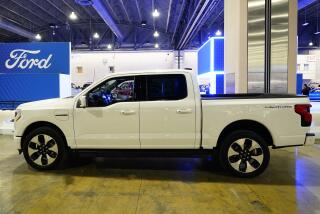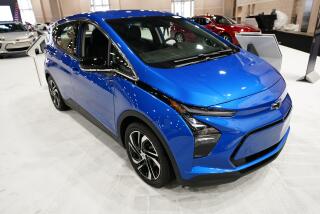Leading the Charge
- Share via
Chevy’s groundbreaking plug-in gas-electric vehicle, the aptly named Volt, has been declared Green Car of the Year.
Conceived by the Green Car Journal, the country’s leading automotive environmental magazine, the Green Car of the Year award is annually presented during the L.A. Auto Show. First bestowed upon the Mercury Mariner Hybrid in 2005, the award has previously gone to three gas-electric hybrid vehicles (the Mariner, Toyota Camry Hybrid and Chevrolet Tahoe Hybrid) and two clean diesels (Volkswagen’s Jetta TDI and, last year, the Audi A3 TDI).
This year, for the first time, the list of five finalists included two primarily electric-drive vehicles alongside two hybrids and a gasoline-only model. In addition to the Volt, the nominees included the Ford Fiesta, Hyundai Sonata Hybrid, Lincoln MKZ Hybrid and the Nissan Leaf.
“Automakers are taking different approaches to providing green cars. Some are offering their first-ever hybrid models, while others are breaking new ground with modern battery-electric vehicles in different forms,” said Ron Cogan, editor and publisher of the Green Car Journal and editor of GreenCar.com. “Plus, we’re seeing a growing number of conventional internal combustion vehicles that are offering much better fuel economy, in some cases with mpg numbers that rival hybrids.”
This year’s Green Car of the Year jurors included leaders of top environmental organizations: Carl Pope, chairman of the Sierra Club; Frances Beinecke, president of the Natural Resources Defense Council; Jean-Michel Cousteau, president of the Ocean Futures Society; and Matt Petersen, president of Global Green USA. Rounding out the jury were Green Car Journal editors, “Tonight Show” host and car enthusiast Jay Leno, and automotive icon Carroll Shelby.
Here’s a look at this year’s nominees.
Chevrolet Volt
General Motors’ first plug-in gas-electric vehicle, the Volt has been hailed by some reviewers as the Detroit giant’s best car ever. “[It’s] a first-of-its-kind production car that allows driving on battery power without the inherent limitations of an electric vehicle,” Cogan explained. “After 25 to 50 miles of all-electric driving, an onboard gasoline engine-generator powers the electric motors to enable drives of any length without the need for a charge.” Priced at over $40,000 (before tax credits), the Volt may initially be only a niche seller, but its ultimate impact on the industry could be huge.
Ford Fiesta
Ford’s little front-wheel-drive Fiesta has been a fixture on foreign roads of late, but it is only now arriving stateside. What has America been missing? A potentially game-changing entry-level model, available as a hatchback or sedan, with excellent build quality, an impressive array of available features, up to 40 mpg highway — and a starting price of just $13,320. “Offering hybrid-like fuel economy without the complexity and cost of a hybrid powertrain results in a truly affordable green car for the masses,” Cogan said.
Hyundai Sonata Hybrid
“Hyundai’s first-ever hybrid … is well-done and offers up to 40 mpg highway fuel efficiency,” Cogan said. “While its profile doesn’t shout ‘hybrid,’ aggressive front and rear styling different from the standard Sonata allows drivers to make the statement they’re driving one.” The Korean company is the first to market lighter, smaller lithium-polymer battery technology in this stylish mid-size sedan. The Sonata Hybrid starts at a head-turning $24,900.
Lincoln MKZ Hybrid
Consumers won’t pay a premium to enjoy the green luxury of Lincoln’s mid-size MKZ Hybrid: its $35,180 MSRP is the same as the conventional gasoline version. The MKZ Hybrid achieves a best-in-class 41 mpg city/36 mpg highway (versus 17/29 for the base V-6). “With its MKZ Hybrid, Lincoln makes the statement that luxury, performance and efficiency can harmoniously coexist in an exciting passenger car,” Cogan said.
Nissan LEAF
Nissan’s compact five-door Leaf will be America’s first mass-market, full-use battery-electric car when it rolls into select markets, including California, next month. Its $32,780 announced price is attractive. “The car is stylish and well-engineered, offering consumers a sophisticated and feature-laden package that achieves zero localized emissions and uses no petroleum, while driving like a conventional car,” Cogan said.
— Paul Rogers, Custom Publishing Writer






